Behind the scenes at ‘the biggest little rodeo in the West’
share

GROVER, Colo. — Shane Burris clambers up a ladder to the roof of the rodeo announcer’s box. He steps into the endless prairie sky and adjusts a set of speaker cables. Burris doesn’t usually do his own sound, but Grover is different.
“One thing that makes this rodeo different is that we don't have a lot of bells and whistles. It’s strictly rodeo,” he said.
Despite outcry from animal rights activists who argue that rodeo animals face cruel conditions, rodeo remains one of the fastest-growing sports in the country.
Burris is no stranger to the scene. He first picked up the microphone over 30 years ago. Today, Burris raises bucking bulls in Mosca, Colorado, hosts rodeos across the state, operates a bull riding school and regularly announces competitions around the West.
“My dream has always been to announce the National Finals Rodeo. I mean that's the number one event in our game,” said Burris, referring to the Professional Rodeo Cowboys Association championship rodeo held in Las Vegas every year.
This year marked the 101st anniversary of the Earl Anderson Memorial Rodeo in Grover, a small town in Weld County about 10 miles south of the Wyoming border. Although the show regularly attracts top-level talent, community organizers haven’t strayed from tradition. To this day, spectators can camp right next to the rodeo grounds.
“It gives the community pride,” said Burris.
When you arrive in Grover, population 165, you’d be forgiven for thinking you had already stumbled into the vast grasslands of Wyoming. Thankfully, an aquamarine water tower painted with the town’s name reminds you where you are.
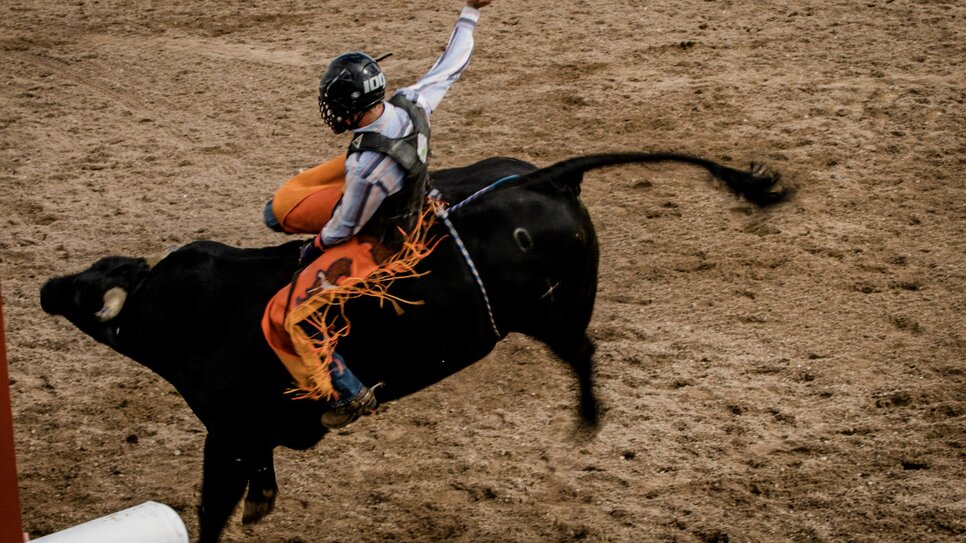
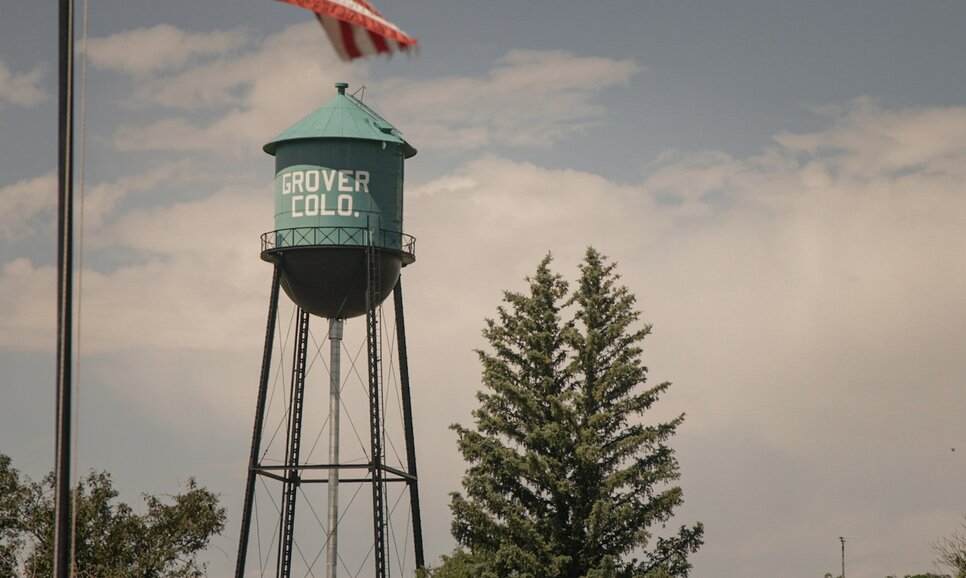
The Grover water tower marks the site of the town's longtime rodeo.
Photos: Cormac McCrimmon, Rocky Mountain PBS.
Burris has history in Grover. In 2003, the Grover committee was the first pro rodeo to hire him.
“I was riding bulls in college for Northeastern Junior College. And one night in practice, I got stepped on, broke my leg,” he said. “It was right during that time when ‘8 Seconds’ the movie came out and you know, bull riding really blew up.”
At the time, Burris had a friend who was announcing jackpot bull-riding competitions in Windsor, Colorado. His friend asked if Burris could step in while he healed.
“I said, ‘really? You want me to announce the bull riding?’” he said. “Well, they didn't know that when I was in high school, I competed in public speaking. And so, I was comfortable with the microphone.”
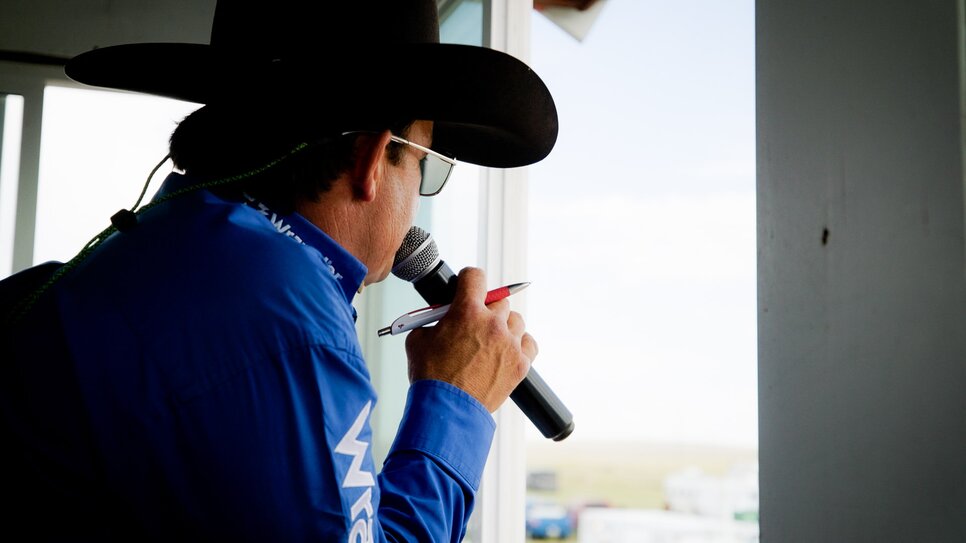
Burris first picked up the microphone over 30 years ago after suffering a bull riding injury.
Photo: Cormac McCrimmon, Rocky Mountain PBS.
Photo: Cormac McCrimmon, Rocky Mountain PBS.
At 1:30 pm, rodeo fans poured into the stadium. Burris ignited the crowd.
“Ladies and gentlemen, we welcome you to the first performance of your Earl Anderson Memorial Rodeo, home of the biggest little rodeo in the West. How are you doing out there on a Saturday afternoon?” he boomed.
Once the hoots and hollers of rodeo fans have faded, the gritty reality of rodeo life emerges. It’s a life built on dreams. Cowboys and cowgirls wind their way through the West, risking death and taking life by the horns.
“The thing about rodeo is one second you can be sitting on top of the world, and the next second you can be so humble. It happens that fast in rodeo,” said Burris. “You have to be able to trust your dream if you're going to make that dream a reality. You have to trust that your dream is right and that it will get you to where you want to be.”
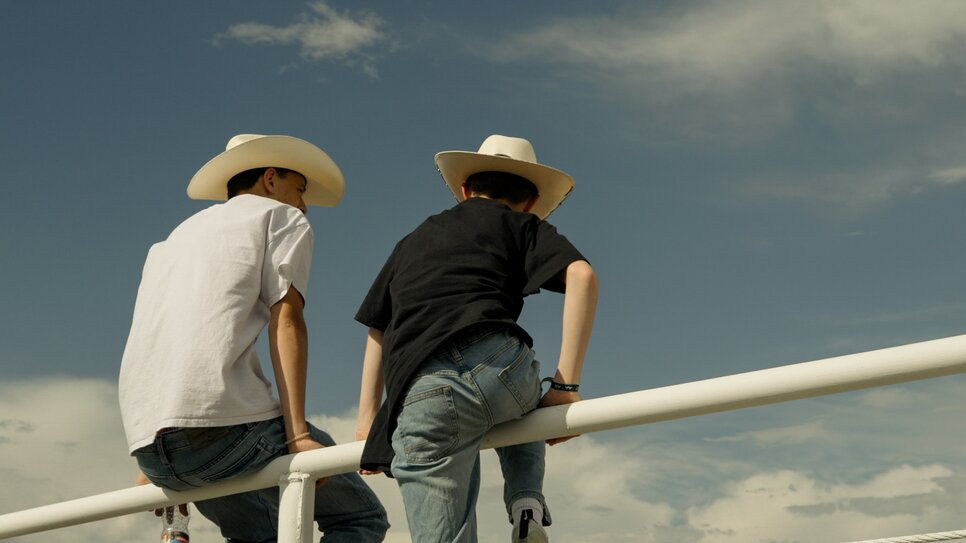
Young cowboys watch the action at the Earl Anderson Memorial Rodeo.
Photo: Cormac McCrimmon, Rocky Mountain PBS.
Photo: Cormac McCrimmon, Rocky Mountain PBS.
Burris’ daughter, Kensley Bowman-Burris, is well acquainted with this reality. She’s 9, but already possesses a sharp ability to tell it like it is.
“These people that just sit in the audience don't see what we do behind the scenes. We stop the rodeo at nine, but we don't get home until 1:00, 2:00 [a.m.] from working and mopping.” she said.
Despite the hard work, Kensley Bowman-Burris loves rodeo. Before the show, she asked her dad why she has to go to school at all. Burris has no qualms about his daughter competing.
“I want my daughter to compete. I want her to be a champion in the arena because there's no better feeling than walking out of that arena knowing that you're a champion, that you just won,” he said. “It gives you a great sense of accomplishment, but also what you learn in that arena will help you in everyday life. Because in rodeo you have to try. And if you don't put forth the try and the effort, you will not be successful.”
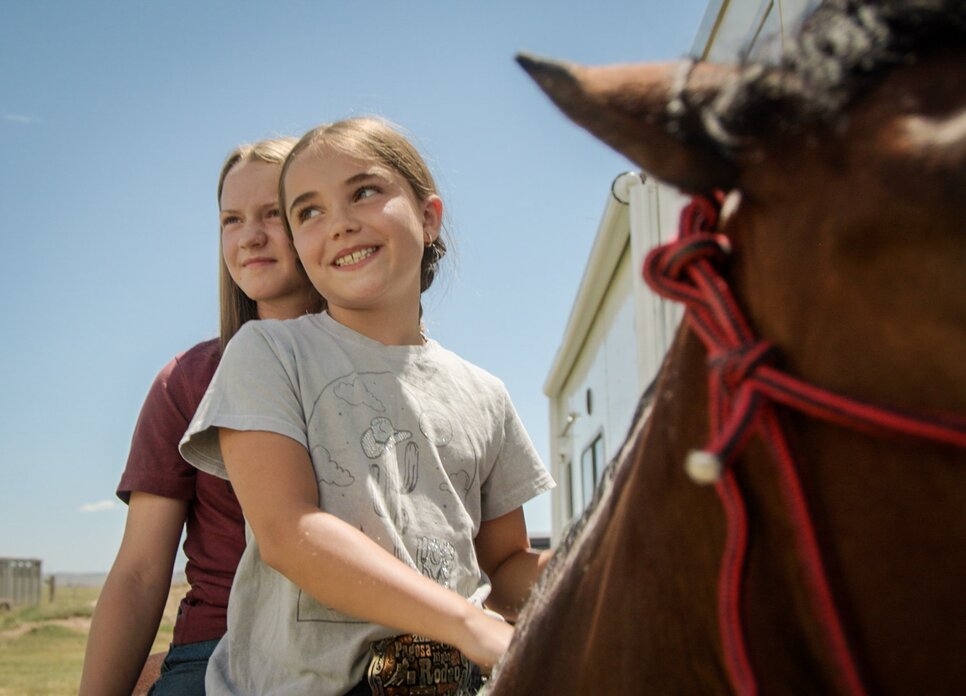
Kensley Bowman-Burris and her friend wait for rodeo time.
Photo: Cormac McCrimmon, Rocky Mountain PBS.
Photo: Cormac McCrimmon, Rocky Mountain PBS.
“He really tries to be a good father to me. And he's like, he's the best version of a dad that you can really be,” said Bowman-Burris. “The one thing he can be a little bit better about is to let me ride steers.”
Halfway through, a thunderstorm crashed the party, but the show went on. Burris rallied the crowd behind each bull rider, steer wrestler and barrel racer as she flew through the arena.
“Wait till she gets around the third [barrel], and I want you to make some noise and help her home. C’mon everyone. Kick, kick, kick,” roared Burris.
“Not only is it my job to help other people feel good about themselves, but I always tell people, hey, if I'm not having fun, I'm not doing my job,” he said. “If I'm up there having a good time, they just can't help themselves but have a good time.”